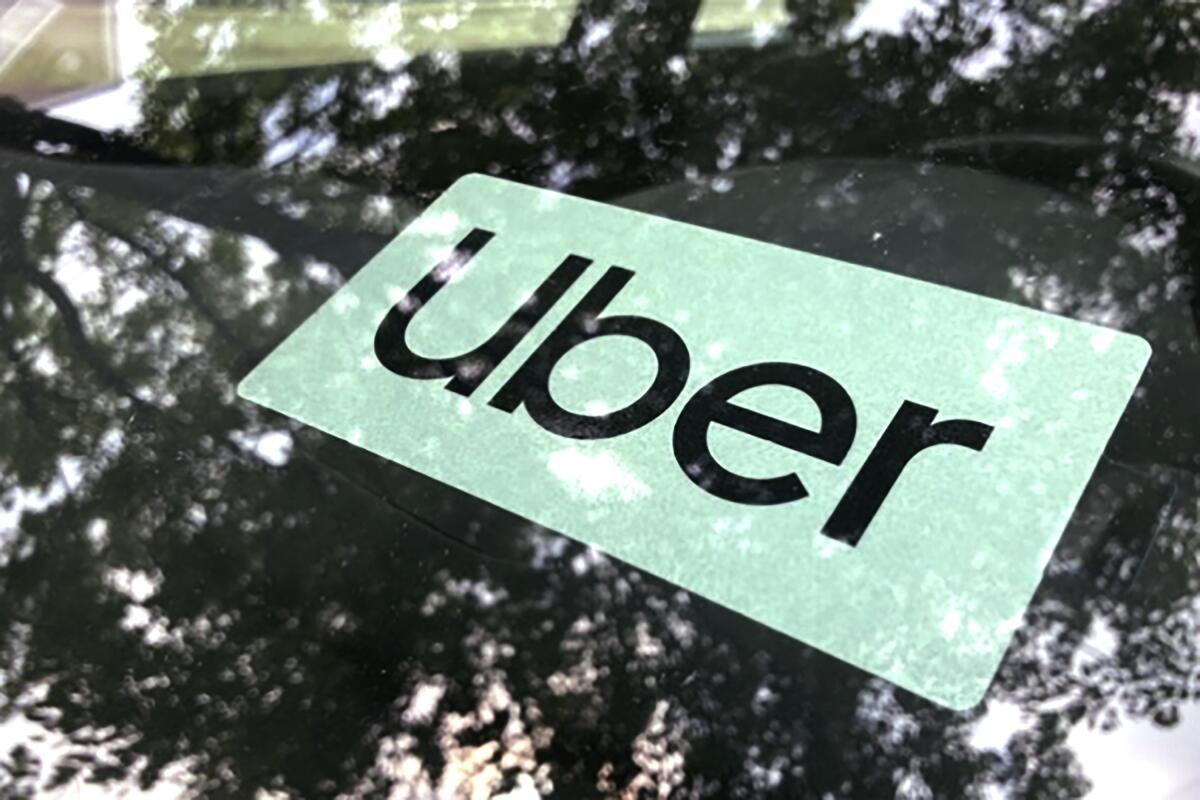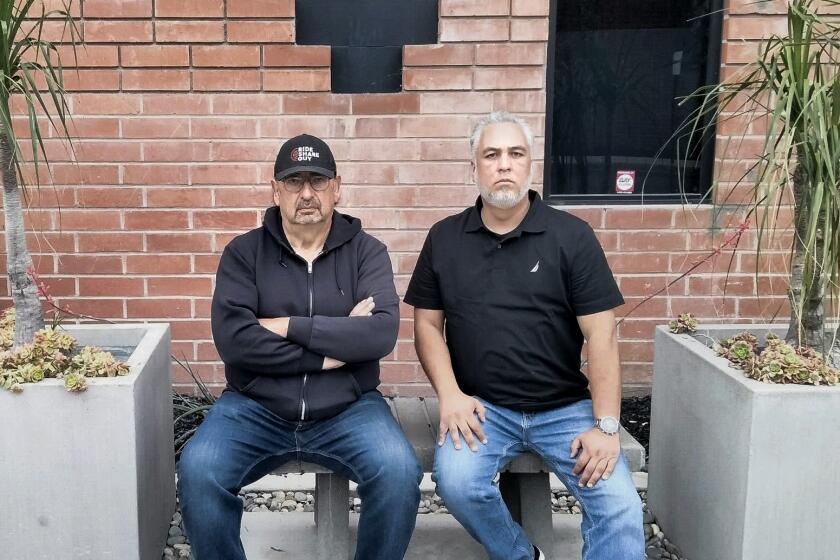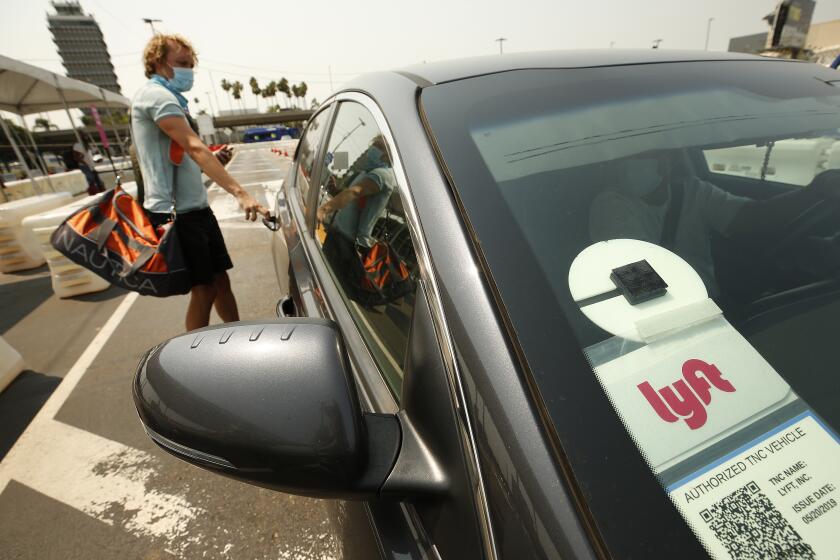Uber strikes deal to partner with Yellow Cab, other taxi fleets in Southern California

- Share via
Uber took another leap forward in its plan to pull more taxis onto its platform, announcing a partnership on Tuesday with Los Angeles Yellow Cab and other taxi fleets in Southern California.
The deal gives six taxi fleets operating in Los Angeles, Orange and San Diego counties access to trip referrals from Uber.
Uber, soon after it was conceived in 2008 as a luxury car service, set out to disrupt the U.S. taxi industry and went on to aggressively elbow its way into the global transportation industry. But Uber is now hoping that the traditional taxi business, its former enemy, will support its next wave of growth.
Uber at first struck partnerships with taxi companies mostly outside the United States. Last year it unveiled an agreement in the U.S., announcing a deal with taxi companies in New York City and a similar agreement with Flywheel Technologies in San Francisco.
“As we continue to strengthen our relationship with the taxi industry, we’re excited to announce our partnership,” Camiel Irving, Uber’s general manager of U.S. and Canada mobility, said in an emailed statement. “We’re encouraged by the support from local regulators in California and look forward to continuing to work closely with our taxi partners to bring the benefits of this program to more taxi drivers and cities throughout the country.”
After Uber and other gig giants failed to pay a mandated rate hike, two eagle-eyed drivers started asking questions — and won a jackpot for California gig workers.
William Rouse, chief executive of the Southern California taxi operations involved in the deal, said teaming up with Uber gives taxi drivers access to more riders, while aiding Uber with an infusion of hundreds of additional drivers.
“We’re totally excited about this partnership,” Rouse said. “We’re totally happy with this. This is going to put more money in the drivers’ pockets.”
He said that over the years the taxi industry has lost much of its night business, with trip volume down during those hours; he sees the partnership as a “huge opportunity” to rebuild that presence.
Rouse’s six taxi companies total about 1,200 vehicles; they include San Diego Yellow Cab, California Yellow Cab, Los Angeles Yellow Cab, Long Beach Yellow Cab, Fiesta Taxi Cooperative Inc. and United Checker Cab.
Uber used to call the taxi industry corrupt and greedy, and the taxi industry has long said Uber and other app-based platforms that burst on the scene wrecked their business model and destroyed their drivers’ livelihoods.
The seemingly random firing of drivers is one way ride-hail companies keep workers powerless. Can’t they bear the cost of humane engagement?
But Rouse said he prefers not to focus on the sordid past. He said Uber first reached out to the taxi industry at a trade association conference a few years ago: “It was surprising, but I think everything’s gone really well. In my personal discussions with [Uber] I’ve seen nothing but professionalism.”
Uber and the taxi companies’ technology will be integrated in phases. At first, Uber’s app will be loaded onto drivers’ tablets, and drivers will receive calls via the app. Eventually, Uber will integrate directly with the taxi companies’ dispatch system.
L.A. Yellow Cab and its partner fleets that Rouse oversees all offer rides on digital platform RideYellow. Once taxi drivers sign up, they will begin to receive Uber trip referrals in the coming weeks.
After Uber’s San Francisco taxi pilot program went public last year, some taxi drivers voiced concerns about Uber’s continually growing presence. Uber pointed to a quarterly analysis by the San Francisco Municipal Transportation Agency that found drivers who provided Uber trips from April through June of this year earned an average of $1,767 a month from those trips, which was 23.8% more on average than taxi drivers who did not provide Uber trips.
Uber has mishandled onboarding for transgender and nonbinary drivers, who faced rejected IDs, suspended accounts and safety concerns.
Although Uber is regulated at the state level, taxi companies are regulated locally, meaning Rouse’s taxi fleets are largely overseen by the cities in which they operate.
Last year, the Los Angeles City Council approved an ordinance to offer digital upgrades to taxis, giving riders better access to taxis via cellphone apps such as those Uber and Lyft operate.
The measure gave ride-hail apps access to traffic and other city data intended to make dispatching drivers more efficient. It also removed caps on the number of authorized cabs receiving 10-year permits to operate. City officials had said they would monitor how well the system was working and analyze drivers’ wages, fleet size, wait times and ride frequency.
More to Read
Inside the business of entertainment
The Wide Shot brings you news, analysis and insights on everything from streaming wars to production — and what it all means for the future.
You may occasionally receive promotional content from the Los Angeles Times.













